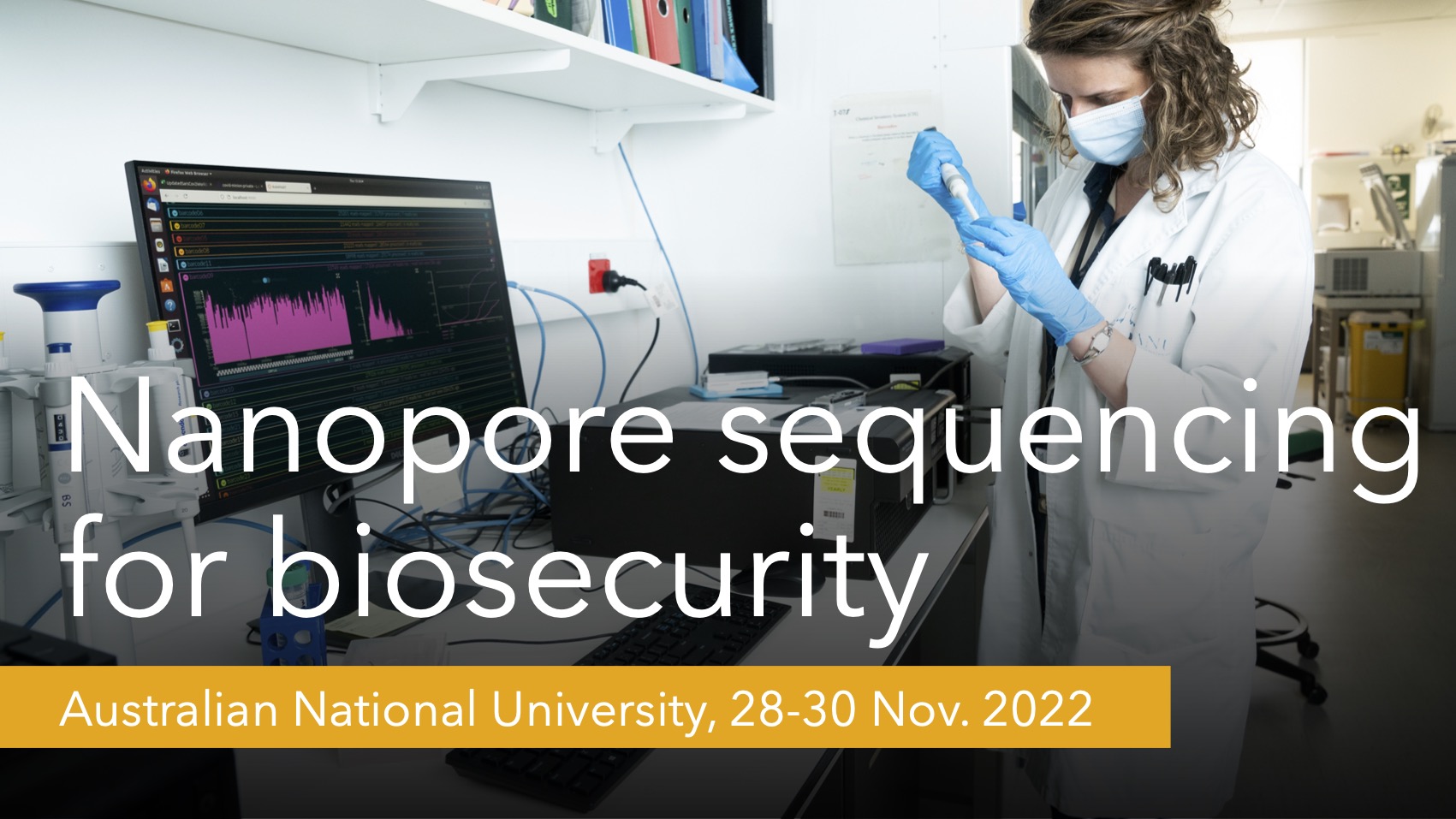Nanopore sequencing for biosecurity
A biosecurity-focused workshop that aims to contribute to capacity building and establish a community of practice of Nanopore sequencing focusing on biosecurity and eDNA.
Event series
Cost
Cost per person: 800.00
Content navigation
RegisterDescription

Nanopore sequencing has opened up the potential of novel biosecurity applications in every laboratory due to its portability, small foot print, and minimal capital investment required. Nanopore sequencing can be used to reconstruct full genomes, detect pathogens in complex samples, and to trace pathogen evolution in real time as highlighted by the tremendous work on Sars-Cov2 during the pandemic. Yet to fully exploit Nanopore sequencing’s potential and to modernise Australian biosecurity we need to build capacity and proficiency for end-users with hands-on workshops in sequencing and data analysis.
This biosecurity focused workshop aims to contribute to capacity building and establish a community of practice of Nanopore sequencing focusing on biosecurity and eDNA. We will share our collective knowledge on applied Nanopore long-read sequencing that we have accumulated since 2016 and encourage others to do the same. See our 2019 Long-read, long-reach sequencing workshop.
This full three-day intensive community workshop is tailored to raise the boat together by providing:
- Insight into the latest updates on Nanopore sequencing technology;
- World-class introduction to sample preparation with either a focus on amplicon (e.g. metabarcodes) or whole sample (e.g. genome) sequencing;
- Hands-on training for Nanopore sequencing;
- Run QC;
- Introduction into downstream bioinformatic sequencing analysis; and
- Q&A panel discussion on how to apply Nanopore sequencing to biosecurity issues.
In the spirit of community building, all talks will be live-streamed and recorded. All protocols will be deposited on protocols.io. This way, this workshop will contribute to lasting resource for everyone to build on each other's work.
Expression of Interest
Places for the workshop, both wet and dry lab, are strictly limited to 40 attendees (we have doubled capacity already due to popular demand). We will have two lab components with places for 20 people in each:
- Session A - focusing on amplicon and metabarcode sequencing; and
- Session B - focusing on native DNA long-read sequencing for genome assembly.
Workshop spots will be assigned to achieve maximum impact across the sector. If the workshop is oversubscribed, which is likely based on our EOI from earlier this year, we will reach out to laboratories and institutions with multiple applicants. The selection committee will also consider a diversity of participants in all shapes and colours. We will strive towards a diverse and inclusive workshop experience for everyone.
There are a limited number of fellowships available worth $400 each to assist with attending the workshop. These fellowships can be used for offsetting travel costs, registration fees, childcare expenses, partner travel or similar.
Applications will close 30 September, 2022. Successful applicants will be notified and sent a registration link by 14 October 2022. Registration and payment is due by 28 October.
In addition, we welcome requests for bespoke workshops in the future. Please contact Niccy Aitken for more information.
Download flyer
Program outline
The workshop will be held 28-30 November at the Acton Campus of the Australian National University, Canberra. There will be three full days starting 9am and finishing 5-6pm depending on progress.
We will provide morning tea each day and food and drinks for the social event. Dietary requirements can be requested at registration. Lunch and coffee can be purchased at the nearby Little Pickle Cafe in the Robertson Building or at Kambri (ANU Union).
Pre-workshop
- Submission of samples to be sequenced if applicable. Please fill in this submission form and post all samples by 14 November (estimated arrival).
- Computers will be provided for wet lab sessions but you will need to bring your own laptop for the bioinformatics sessions with VirtualBox installed prior to the workshop. Detailed instructions will be emailed.
Download Program
Science talks
Tues 29 Nov | Slatyer Seminar Rm, RN Robertson Bldg (above Little Pickle cafe)
This (free) session is open to the general community - all welcome.
|
1:30pm: Introduction
1:45pm: Nanopore sequencing - Warren Bach, Oxford Nanopore Technologies Ltd.
2:30pm: DNA Metabarcoding for High-throughput Insect Surveillance - Alexander Piper, Agriculture Victoria
2:50pm: Lessons learnt from calling methylation status of cytosines directly from ONT reads - Yi Jin Liew, CSIRO
3:10pm: Rapid plant pathogen detection: a few examples - Sandra Visnovsky, NZ Institute for Plant & Food Research Ltd.
3:30pm: Break
3:50pm: Metabarcoding ants (Hymenoptera: Formicidae) for biosecurity: a tale across different sequencing platforms - Francesco Martoni, Agriculture Victoria
4:10pm: Monitoring for non-native species in Antarctica using eDNA metabarcoding - Leonie Suter, Australian Antarctic Division
4:30pm: Species identification on the go - Luana Lins, CSIRO
4:50pm: A rapid and accurate identification of invertebrate pests at the borders using MinION sequencing of DNA barcodes - Shamila Abeynayake, Dep. Agriculture, Water & Environment |
Location
RN Robertson Building and Science Teaching Building, Australian National University, Canberra




